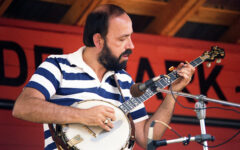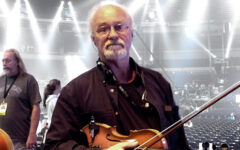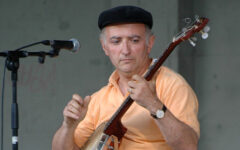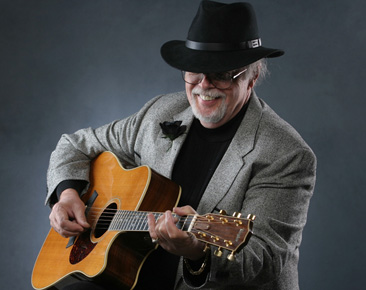
This reflection on three legends who have passed on during 2012 is a contribution from flatpicking legend Dan Crary. In addition to being a pioneering guitarist, Crary is an Associate Professor of Speech Communications at California State University at Fullerton. Dan is said to be working on a new album this Fall.
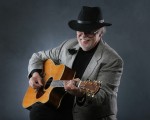 “Give sorrow words” the poet advised; not an easy thing to do when we have seen the passing of some of the greats of our music. And it always comes as a shock; you “know not the hour” as the Bible says. 2012 has been the year of the passing of some of our music’s greatest monumental figures, especially for me, Doc Watson, Earl Scruggs, and Doug Dillard, as well as other greats of our music, including Everett Lilly. Sic transit gloria mundi, “thus passes away the glory of the world.” And so we grieve for these giant figures in our lives and music, we feel their absence, make speeches, write memorials, and as the characters in the play said, gathered around the deathbed of Richard II, “For God’s sake let us sit down upon the ground and tell sad tales of the death of kings.”
“Give sorrow words” the poet advised; not an easy thing to do when we have seen the passing of some of the greats of our music. And it always comes as a shock; you “know not the hour” as the Bible says. 2012 has been the year of the passing of some of our music’s greatest monumental figures, especially for me, Doc Watson, Earl Scruggs, and Doug Dillard, as well as other greats of our music, including Everett Lilly. Sic transit gloria mundi, “thus passes away the glory of the world.” And so we grieve for these giant figures in our lives and music, we feel their absence, make speeches, write memorials, and as the characters in the play said, gathered around the deathbed of Richard II, “For God’s sake let us sit down upon the ground and tell sad tales of the death of kings.”
The tales of Doc and Earl and Doug will be many to tell, in fact they already have been: happily these great players did actually receive some of their flowers while they were living, as the old Stanley Brothers song has it. Earl Scruggs seemed to come out of nowhere in the 1940’s playing a style of banjo that was, by the time the world heard it, so complete, so powerful, that all banjo playing since has been judged by its standard. The old tapes of the Blue Grass Boys on the 1940’s Grand Ol’ Opry record how audiences went beserk for Earl’s banjo, demanding so many encores, it almost stopped the rest of the Opry show.
When Doc Watson burst on the national scene in those early ‘60s Newport Folk Festivals, he blew the New England folkies away with the power of his gravel-pure voice, and the greatest guitar flatpicking that had ever been heard. And when Doc and son Merle toured the world starting in the late sixties, they began the biggest migration of a single musical instrument in history. The steel-string guitar went from deep obscurity in the mid-20th Century to become the most ubiquitous instrument on earth.
Out of all the sincere and well-intentioned attempts of politics, diplomacy, philosophy, religion, and education to get people to be peaceable together, ironically today, the last thing on earth that all seven billion of us agree on is that we like the steel string guitar. If you could get into Tehran, Bejing, or Mogadishu there would be a peaceable jam session, and someone there would know the Wildwood Flower. Having thus swept the world, guitar music may, just maybe, someday save humanity; if it does, Doc and Merle started the trend.
Doug Dillard was another tremendous personality and player, very influential, and with The Dillards band, came roaring out of the California music scene in the late 60’s and early seventies. The Dillards showed the world that bluegrass music, acoustic instruments, and entertaining stories and repartee could make it on a major label and stand on its own surrounded by electrified country and rock music.
So it’s shocking to think of our world without them; for me Earl was the blazing banjo sound that hooked me as a little kid in 1951; in my world, Doc was the fifth face on the Mt. Rushmore of music; and Doug was sassy, smart old time music walking unapologetically up and down Santa Monica Blvd. Now, without them, the world feels very strange, and we wonder what more to say about their absence. Books will be written, memorials created, and most of all, we will tell stories of Doc and Earl and Doug for a long time.
So what more is there to say? Just one thing more: to remind ourselves how their music and their example ought to influence us. In history the great funeral orations were aimed not at the departed, but at the living. Pericles after the Peloponnesian War and Lincoln at Gettysburg, for example, reminded the living to carry on the vision of those being memorialized. And that’s what we can do as we celebrate and feel the loss of Doc and Earl and Doug. We can go back to the source, listen again to the recordings, hear in Doc’s singing and playing what Utah Phillips called “the power of an authorless folksong.” Listen to the beautiful inside stuff of Earl’s banjo, the irony, the tone, the drive. And revisit those sessions from over three decades ago when Doug and the Dillards took bluegrass to town and made it dance in the city streets.
And there is another important tradition that these heroes of our music all taught us: the tradition of, it’s OK to do something different. Realize that the passing greats of 2012 are immortal and revered by us both because they were true to their roots and traditions, and also because the music they actually performed changed everything that went before. Doc, Earl, Doug: all innovators who warped and altered the music drastically while somehow never letting you forget where they (and it) came from. That’s a difficult line to walk: their legacy of rooted-but-different is a challenging course for us to navigate, and it can get divisive. If you don’t think so, just sit in on some of our beer-and-opinions arguments that range everywhere from “bluegrasser-than-thou” to “it’s my guitar and I’ll play what I want to.” It’s a dialogue as old as western civilization: will it be permanence or change? The answer to that one, my friends, had better be: “Yes!”
The examples of Doc and Earl and Doug are a perfect guide into our future. They’re a compass to keep the music on course in some sense, but also to point to the next Earl, Doc, or Doug, the next inspired young player waiting in the wings to knock your socks off.
Think about it: somewhere out there, today, walking around, are the players who will be the heroes of 2062. So our job is twofold: we need to be the old curmudgeons nagging the young players to remember the tradition, and then we need the wisdom to get out of their way as they change things, become Doc II, or the kid-who-will-become-Earl, or a Doug-for-the-next-generation. Because as Lee Hayes of the Weavers famously said: “The future isn’t what it was cracked up to be; and what’s more, it never was.”


